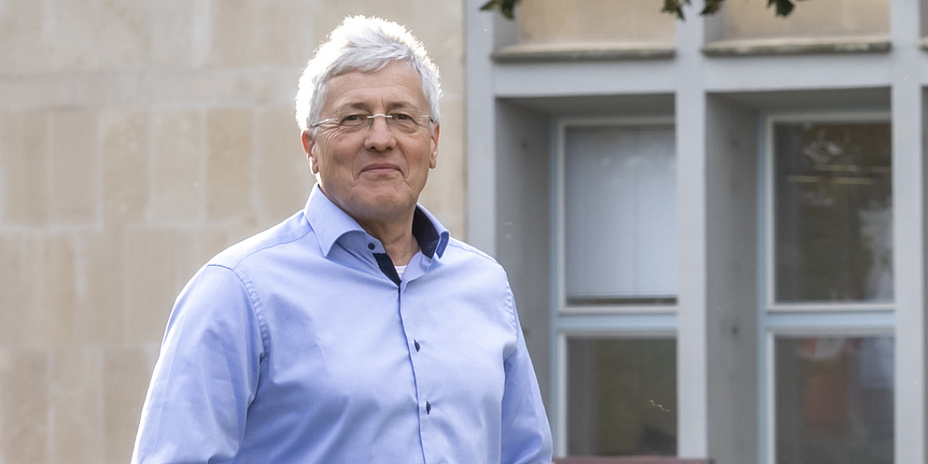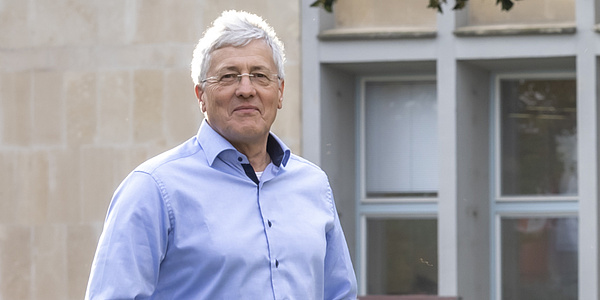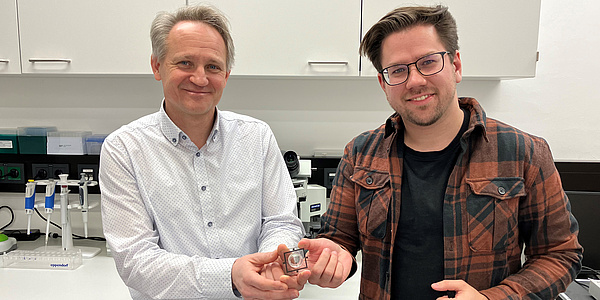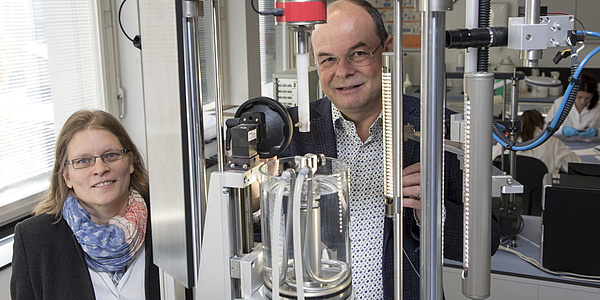Looking for What Controls the Heart

News + Stories: As a biochemist, how did you come to be involved with the heart in your research?
Peter Macheroux: If you look at the heart purely as a muscle, then this is of course more interesting on a physiological level. But if you want to know what factors regulate the heart or influence it, biochemistry comes into play, among other things.
What kind of research have you done in this respect?
Macheroux: There is an enzyme called dipeptidyl peptidase 3 or DPP3 for short. We were able to prove that it is responsible for the high drop in blood pressure that occurs in shock states. The reason is that DDP3 breaks down peptide hormones – also known as angiotensins – which are supposed to ensure that blood pressure remains high. These peptides constrict the blood vessels, when necessary, in order to increase blood pressure – which is why they are also called vasopressors. Blood pressure regulation is important for all organs, but especially for the heart. Without a reasonable blood pressure, the organs can no longer be supplied with blood. This condition is called hypoperfusion and can lead to organ failure, including cardiac complications.
How can this knowledge be used to protect our heart and other organs?
Macheroux: Since we know that DPP3 has no positive effects on the circulatory system, one approach would be to inhibit it using antibodies or small organic molecules during a state of shock. This would prevent the vasopressors from being broken down and thus prevent a drop in blood pressure. A suitable inhibitor could therefore save the lives of people in a state of shock and it is therefore not surprising that such substances are already being developed.
The key mechanism for regulating blood pressure is the renin-angiotensin system
How did you discover that DPP3 has such a major effect on the cardiovascular system?
Macheroux: There are different categories of enzymes in the human body and DPP3 is one of the so-called housekeeping enzymes. In other words, it is always available everywhere. Initially, however, it was not at all known what role the enzyme actually plays in the entire sequence of biochemical processes in the body – at the time, nobody was thinking about the heart. The fundamental question was therefore: what does the enzyme do? Why do we need it at all? It was only in the course of our research that we discovered the connection with the heart and the cardiovascular system.
DPP3 is one factor, but how does the overall biochemical regulation of the cardiovascular system work and how well does research understand this?
Macheroux: The key mechanism for regulating blood pressure is the renin-angiotensin system. As the name suggests, it contains the angiotensins mentioned above. This system as a whole is very complex. It contains a large number of peptides and these are relatively small molecules. But they modulate this whole cardiovascular system. And you could say that this is one of the best-regulated physiological systems in the body. This is necessary because it is extremely important for the organs that a certain blood pressure is present and that it is regulated accordingly. The chemical process in brief can be explained as follows: the peptides bind to receptors and when binding occurs, the receptor sends a signal into the cell, which changes the cell biochemistry.
The field of biochemistry is huge and there are numerous sub-areas. Where does biochemistry connect with the heart?
Macheroux: Muscle biochemistry or muscle physiology is a core area of biochemistry, so the heart as a muscle plays a major role here. There are a lot of biochemists who deal with the structure of muscles, with muscle fibres, and there are certain proteins that interact with each other. The heart as a muscle is particularly interesting for biochemistry because it is switched on again and again. Cardiac muscle contraction is a very coordinated process and has to do with nerve conduction, which is also biochemistry. It's about understanding how signals are sent along the neural pathways and what happens when they arrive at their destination. Enzymes are also involved in this.
We must not forget that the heart beats from the beginning to the end of our lives, and we practically take this for granted, even though it is essential
An electrical signal flows through the nerves themselves and this signal is converted into a biochemical signal at the end. The biochemical signal is then read out inside the cell. Biochemists want to know how a muscle, and especially the heart muscle, is controlled via these nerve impulses. We must not forget that the heart beats from the beginning to the end of our lives, and we practically take this for granted, even though it is essential. After all, the heart is responsible for ensuring that nutrients and oxygen reach all the parts of the body.
Do you have any tips from your area of expertise on how people can take better care of their hearts?
Macheroux: In addition to the general advice to get enough exercise every day, I think it is very important to get sufficient minerals. Above all, you should make sure you consume enough magnesium. A balanced diet is also often mentioned here, although the question arises as to what that means exactly. Our main field of work is vitamin-dependent enzymes. In my view, a balanced diet should therefore focus particularly on vitamins. To summarise, I would say that a sufficient supply of vitamins and minerals is of great importance for cardiac health.
Apart from a healthy or unhealthy heart, there is also the concept of a heavy or broken heart. Can this condition be explained chemically?
Macheroux: Yes, although this is a matter of hormones. If someone is suffering a lot or is experiencing loss, for example because they have lost an important person or have been abandoned by them, then I think that is visible on a hormonal level. In this case, hormones relating to unhappiness are present and this affects the whole body. This has a biochemical component, although the process itself is more a physiological one. But the feeling of being unhappy certainly has a hormonal equivalent and in this respect biochemical processes certainly reflect states of mind to a certain extent.
This research area is anchored in the Field of Expertise “Human & Biotechnology”, one of five strategic foci of TU Graz.
You can find more research news on Planet research. Monthly updates from the world of science at Graz University of Technology are available via the research newsletter TU Graz research monthly.
Kontakt
Peter MACHEROUX
Univ.-Prof. Dr.rer.nat.
TU Graz | Institute of Biochemistry
Phone: +43 316 873 6450
peter.macheroux@tugraz.at



